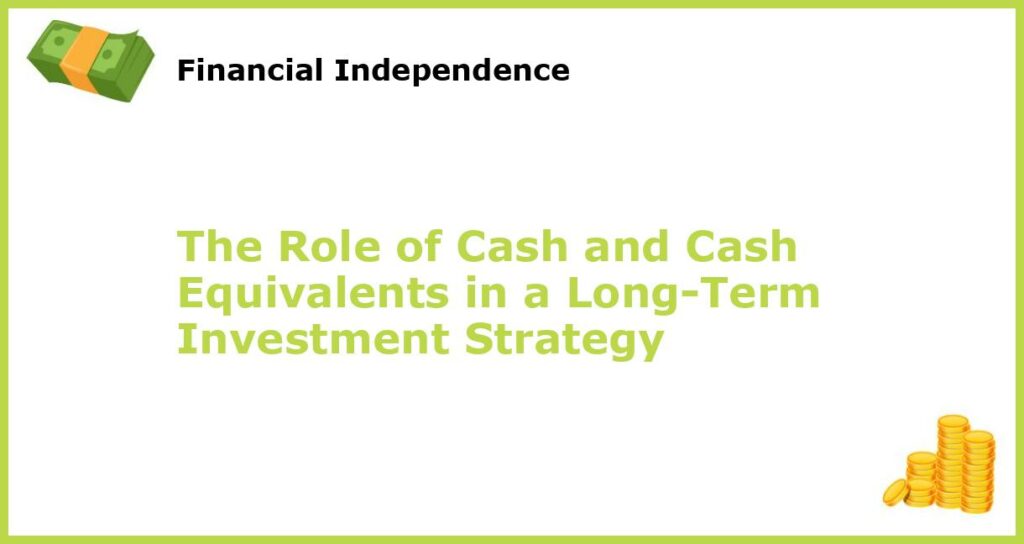The Importance of Cash and Cash Equivalents in a Long-Term Investment Strategy

In a world that places a lot of importance on investment, it is important to understand the role that cash and cash equivalents play in a long-term investment strategy. In investing, cash refers to money that is readily available and can be used to purchase investments. It provides investors with a sense of security and protection against the inevitable ups and downs of the market. Cash and cash equivalents are not just physical cash, as they also refer to high liquidity deposit accounts such as savings accounts or money market funds. Cash plays multiple roles in an investment strategy, each of which is of utmost importance.
Cash as a Safe Haven

During times of market turbulence, investors tend to seek safe-haven assets such as gold, government bonds, and cash. Holding cash offers protection from volatility that comes with equity investment. Cash acts as a safe haven because it generally maintains its value throughout market fluctuations. Savvy investors can use the steady value of cash to balance out the aggressive bets in their investment portfolio. Despite the returns offered by other investment options, many investors keep cash as a way of mitigating risk.
Cash as a Buffer Against Market Downturns

Cash also acts as a buffer against market downturns. When stocks take a tumble, cash can be used to buy shares at lower prices, resulting in bigger returns if and when the market recovers. This strategy applies to other types of investment as well, such as equities and real estate. When investors have a war chest of cash, they can increase their buying power at the bottom of the market. Holding cash provides investors with the opportunity to invest in a way that would not be possible otherwise. Furthermore, this approach to investment can also be used to get through market downturns without the need to sell assets that will decrease in value.
Cash as a Source of Liquidity

An important role of cash in a long-term investment strategy is that it provides a source of liquidity. Investors who hold cash can take advantage of any opportunities that arise because of sudden market changes, by having the necessary funds available for instant deployment. Without cash, investors may be forced to sell assets at inopportune moments, which may result in locking in losses or missing out on gains. Holding cash ensures that investors will have funds readily available at all times which will allow them to remain nimble in taking advantage of investment opportunities.
Cash Equivalents and Fixed Income Investments
Investors can also invest in cash equivalents and fixed income securities, such as bonds, in addition to holding cash. Cash equivalents are typically short-term investments that are easy to liquidate for cash. Money market funds, treasury bills, and bank certificates of deposit are examples of cash equivalents. Fixed income investments provide higher yields than cash, but still offer a relatively low level of risk. However, fixed income investments still have an element of risk, particularly if interest rates increase.
The Importance of Diversification
When incorporating cash and cash equivalents into an investment strategy, it is important to ensure that the portfolio remains diversified. Holding too much cash or cash equivalents can lead to missed opportunities to grow the portfolio, and holding too many equities can result in outsized risks. Finding the right balance requires careful consideration of individual investment goals and risk tolerance. With diversification, an investment’s risks can be spread across a wider range of holdings which can help to minimize portfolio volatility.
Cash and the Impact of Inflation
While cash is looked upon as a safe investment, it is not exempt from inflationary pressures. Cash becomes less valuable over time due to inflation. If inflation is not overcome, the returns on cash and cash equivalents can be negative in real terms. Inflation may not have a significant impact in the short-term, but over the long-term, its impact can erode the value of cash. It is important for investors to strike a balance between having enough cash on hand to meet their financial needs and holding less cash to avoid the long-term impact of inflation.
Cash as a Tool for Rebalancing
To maintain a balanced portfolio, investors need to regularly rebalance their investment portfolio. When assets outperform or underperform, investors may adjust the allocation of their holdings. One way to rebalance a portfolio is by selling assets that have performed well, and holding cash until it is balanced again. By keeping cash on hand, investors have the flexibility to take advantage of portfolio fluctuations. This can help control risk and ensure that investments remain in line with individual goals and risk tolerance.
The Impact of Interest Rates on Cash
Interest rates play an important role in determining the value of cash and cash equivalents. When interest rates rise, cash and short-term fixed income investments tend to offer higher returns. Conversely, when interest rates fall, returns on cash and cash equivalents decrease. As a result, it is important to consider interest rate risk when selecting cash and cash equivalent investments. Therefore, investors must keep themselves informed of the interest rate environment to make informed investment decisions.
Cash as a Tool for Tax Planning
Another way cash can be used strategically in a long-term investment strategy is for tax planning. By holding cash as opposed to realized gains from investments, investors can have control over the timing and amount of taxes paid. Additionally, holding cash and cash equivalents can allow investors to employ tax-efficient investment strategies, such as tax-loss harvesting. When taxes are planned well, it provides a way for investors to keep more of their returns, making cash an invaluable tool in a well-thought-out investment strategy.
Final Thoughts
In conclusion, cash and cash equivalents are essential components of a long-term investment strategy. They offer stability, protection, liquidity, and a measure of flexibility that cannot be matched by other investments. While it is essential to balance the risks versus rewards, investors must also ensure that their portfolio remains diversified. The goal of a long-term investment strategy is to have a well-balanced portfolio that will deliver the desired results while taking acceptable levels of risk, and cash plays a critical role in achieving that balance.







